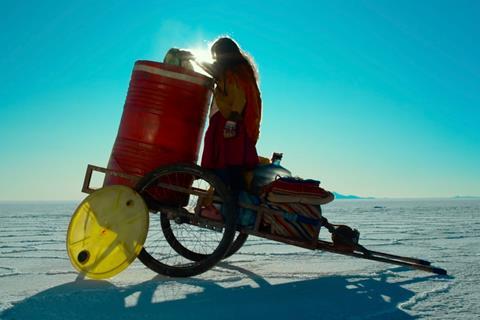
SXSW London’s inaugural edition kicks off on Monday (June 2), with the world premiere of Steven Leckart’s Eminem fandom documentary Stans among a busy lineup of 45 features and 64 shorts.
The festival, as with its Austin, Texas-set older sister, combines a screen, music and tech offering, with speakers ranging from Mubi CEO Efe Cakarel to the head of OnlyFans Keily Blair and co-founder of Google DeepMind Demis Hassabis.
The festival runs June 2-7 across 34 venues around east London, with the screen section taking place across 3 core sites (Curzon Hoxton, Rich Mix and The Barbican) plus a few events in Christ Church Spitalfields and Shoreditch Town Hall.
Steering the ship as SXSW London’s first head of screen is London-based Anna Bogutskaya, critic, author and programmer, who has curated for the BFI, Edinburgh, Fantastic Fest, Sitges and Sheffield DocFest. She was named a Screen International Future Leader in 2019, was festival director for female-focused short film festival Underwire Festival from 2015-2022 and has been working full-time for SXSW since last August.
Suffice to say, Bogutskaya knows a thing or two about festivals, and is fizzing with excitement in the build-up to her most high-profile gig to-date. “I’m buzzing. It’s like a train, it’s on the tracks, there’s no stopping it,” she says. “Things come at you, and you just find ways to manoeuvre and solve them. It’s the best feeling in the world.”
Bogutskaya sat down with Screen on the eve of the first edition to discuss audiences, programme highlights and future ambitions.
What does SXSW London offer that’s different to what is out there on the UK festival circuit?
A true intersection between businesses, between technologists and creatives, thinkers, filmmakers, artists, musicians. That melting pot is completely unique to us in the UK and possibly Europe.
Audience-wise, who are you targeting?
We have a very specific focus on international audiences. London is an international city, both myself and my team are not London-born [Bogutskaya is Spanish, of Russian origin], we bring by default an international perspective. The audience that we see buying passes and attending are hugely international. People are coming from over 45 different countries. That’s a massively international audience.
A key part for me has been to try to not programme a traditional film festival, because of the melting pot of people coming from different countries, different businesses and different areas of expertise. Film festivals can get quite insular, we all have our rules, styles and traditions. They are amazing, film festivals are the love of my life, but one thing I wanted to make sure is we demystify it.
What are some of your programme highlights?

I’m really chuffed with Stans. It’s so funny, it’s such a great tone setter, and it was such a coup. It fits into what SXSW represents. I’m really in love with animated [Berlinale premiere] Lesbian Space Princess, which is playing in our competition. I programmed really early on a documentary about farm animals called Silent Observers, by Eliza Petkova. It’s one of those little gems. Cielo by Alberto Sciamma is a really gorgeous, surreal, coming of age film.
Will Eminem be making an appearance?
Unfortunately no, but there will be something really special at the Stans screening.
What has been selling well?
Shoot The People, the Misan Harriman documentary, has sold out all of its screenings. The premiere of BBC Three series What It Feels Like For A Girl was the first thing to sell out. Cielo has gone really quickly.
How did you approach programming?
You’ve got a blank slate and no systems, no team and just a complete carte blanche to build a festival from scratch. How do you programme that? I chose not to open for feature submissions in the first year because we didn’t have the eyeballs to watch all those films, and I take submissions really seriously. It’s a huge commitment to open up for submissions in a first year. It was all scouting, relationships, scouting different festivals, speaking with filmmakers, producers, people we knew, people we didn’t know, films I’d been tracking for a while.
What is your team structure?
We’re essentially three festivals under one umbrella. For my team, I’ve been working with Isra Al Kassi of T A P E Collective, who is my programme producer, also Rafa Sales Ross, who I worked with when I was programming Edinburgh. We also have a team of three exclusively looking at short films.
How much interaction have you had with the US SXSW team?
They sort of friendly left me to it. We’re an independent company and independent festival. It’s a completely brand-new operation. The company is new, the team has been built up from scratch [Max Alexander, former CEO of Secret Cinema, is SXSW London’s CEO], but obviously we license the [SXSW] brand.
How do you feel about the six day June slot? Could the festival move further away from Cannes, or run for longer?
These [questions] are very much a June 8 mindset. Is there a perfect date considering the landscape of festivals? The feedback we’ve received is there is a lot of excitement about having a summer festival in between the big hitters. The Cannes dates are tricky, but there is enough room and enough audiences to go around.
Compared to other UK film festivals, SXSW London is more on the expensive side (prices start at £595+VAT for a three-day pass, compared to £155 for a standard BFI London Film Festival industry pass and £80 for an Edinburgh industry pass). What would you say to people who have reservations about the cost?
The full pass [£1000+VAT for six days] gives you access to not just screenings but all the talks, the whole range of the conference [which features 862 speakers]. It is an enormous amount of sessions and panels across so many different venues. The other element is the public ticketing, and that has been priced consciously and accessibly – £12 per ticket and £15 for the headliners happening at the Barbican – which is very accessible not just for London cinemas in general, but specifically for festival pricing. That has been thought of as a way of allowing people to sample a portion of the festival, to see if it’s for them.
What are your ambitions for year two?
One thing I want to delve deeper in is the intersection and convergence [between festival strands], to be more in conversation with the music industry and tech, and how does that displays itself in film.
Amid the pressure and chaos of pulling off a festival, what do you do to switch off and unwind?
Doom scroll through interiors TikTok! I just want a beautiful lamp I can look at while I wind down.















![[L-R]: Amanda Villavieja, Laia Casanovas, Yasmina Praderas](https://d1nslcd7m2225b.cloudfront.net/Pictures/274x183/6/4/1/1471641_pxl_20251224_103354743_618426_crop.jpg)






![[L-R]: Amanda Villavieja, Laia Casanovas, Yasmina Praderas](https://d1nslcd7m2225b.cloudfront.net/Pictures/100x67/6/4/1/1471641_pxl_20251224_103354743_618426_crop.jpg)


No comments yet